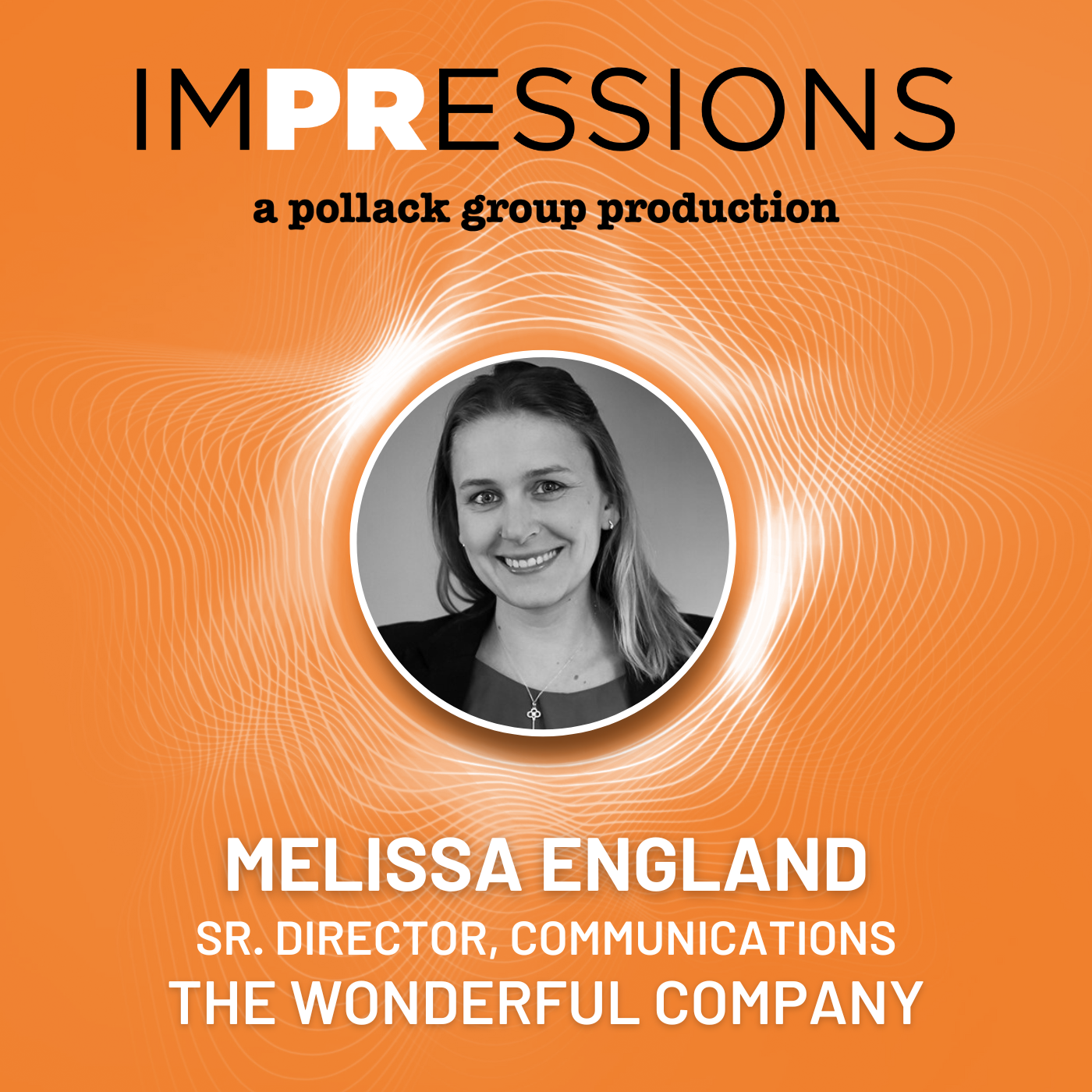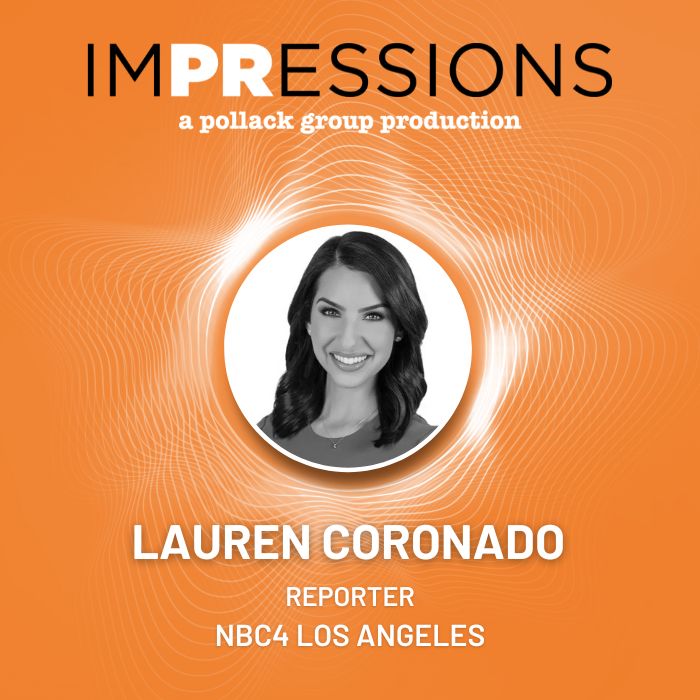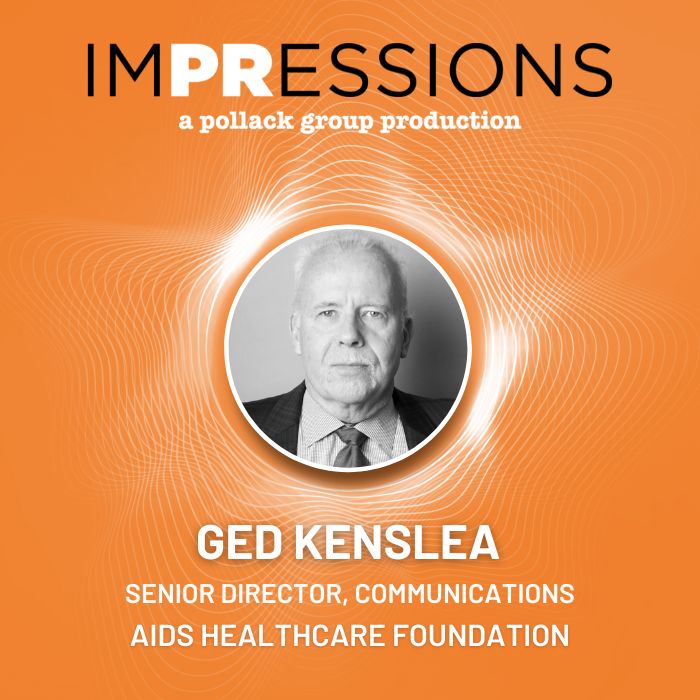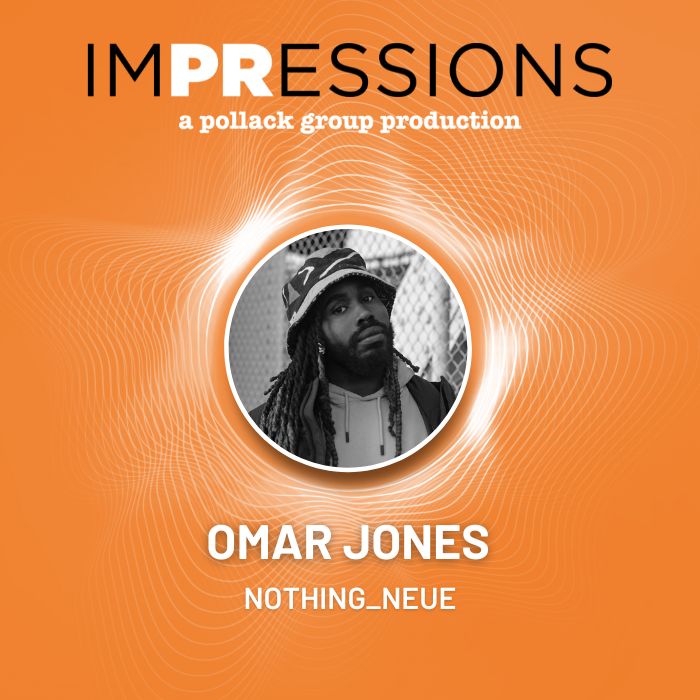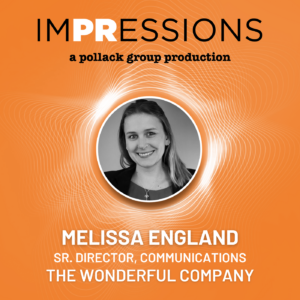 Ever wonder what the core differences are between in-house and agency PR? From working with various industries to the hustle and bustle of finding new business, the foundation of PR differs significantly, whether you’re employed at a firm or opt to focus on just one company. Melissa England, Senior Director of Communications at The Wonderful Company, has worked in-house and at award-winning agencies and joins us today to discuss how the two worlds differ. Tune into episode 8 to unravel the secrets of these two parallel universes.
Ever wonder what the core differences are between in-house and agency PR? From working with various industries to the hustle and bustle of finding new business, the foundation of PR differs significantly, whether you’re employed at a firm or opt to focus on just one company. Melissa England, Senior Director of Communications at The Wonderful Company, has worked in-house and at award-winning agencies and joins us today to discuss how the two worlds differ. Tune into episode 8 to unravel the secrets of these two parallel universes.
ImPRessions Episode #8 Transcript
Kalli: There are two types of PR and marketing people in this world, in-house and agency people. The main and most obvious difference is that people who work in-house are full-fledged members of their company. They eat, sleep and breathe it, whereas agency people work with multiple clients at the same time. To dive into the differences between the two. We welcome Melissa Englund, senior director of public relations at the wonderful company, the company behind Fiji Water. Wonderful pistachios. POM Wonderful. Justin Wine and many more household brands that we all love. Prior to working in House, Melissa spent ten years on the agency side, enabling her to see both sides of the PR and marketing world. Melissa, thank you so much for joining us here today. We’re thrilled to have you and to hear about your differing experiences.
Melissa: Thank you for having me. It’s exciting to be here.
Jenn: Yeah, Thanks for joining. So I know that we connected prior to this call and got to know you a little bit more and just taking a look at your background, it seems that from the very beginning you have always been interested in PR so can you tell us a little bit about what attracted you to the industry and how you got started?
Melissa: Absolutely. Yeah. Think I’m a bit of a rare breed in that I knew straight out of high school I wanted to pursue a career in PR that if I had to think of an Aha moment, it was while I was touring the campus of what would become my college Cal State Northridge Go Matadors. They had a list of jobs or careers you could get within various majors. And I was looking at communication studies, I was looking at journalism, and then there it was on both public relations. So I went home, studied it a little bit more, debated for maybe 10s if I wanted to do broadcast journalism instead. And I realized PR had encompassed everything I was looking for in a career, I knew I wanted a job that would challenge me where no two days look the same. I didn’t want to be behind a desk all day, but rather having a job where I was constantly interacting with others. I actually look back and laugh now, knowing how much time I spent behind a computer and on email. But PR has really satisfied me. I think it strengthened me as a person. It’s taught me so much. I’m constantly learning something new every day, whether that’s changing social platform or digging deeper into various stories that are within my company. And I’m really grateful for that.
Jenn: I love hearing too, when people say, oh, I start like I knew when I was in high school or I knew when I was in college because Carly I think that was sort of your experience. You stumbled upon PR in college. So it’s like a very, a very similar journey because I didn’t really know about PR until I was already in a career. So I just love having that type of guidance in school to be able to like pull you into something right away and know like, this is where I belong.
Kalli: Yeah. My, my first, um, my first class, I fell in love, and I haven’t looked back since.
Melissa: I had that exact same reaction. That love affair really started when I had my first internship. So there was a paid opportunity for the LA Auto show, and I actually ditched one of my finals to be able to do the internship and staff the event. And as soon as I walked into the LA Convention Center on one of those first press days, there was 4000 media there through the two days, and just my adrenaline was running 100mph. You know, I felt at home. I loved everything about being on site. And it really solidified that for me. I definitely found my calling and that was just emphasized in my coursework and the other internships I took after that. It really set the foundation and just kicked off that love story for me.
Kalli: That’s really amazing. And, you know, I know in our previous conversations, you know, you told us a little bit about your experience, you know, starting an agency life to joining an in-house PR team. Why did you decide to make that change and what has been your experience going from an extension of the team, which we often say as an agency partner to a full fledged team member?
Melissa: I had an amazing ten years at Finn Partners, the Rogers Group, so I ended up back at the place I started my first internship with. I said I fell in love and that’s absolutely accurate. And a year and a half later, I joined the team there and I wasn’t really looking to change, but I was presented with this opportunity at the wonderful company and I felt I just needed to take on a new challenge. The thing that attracted me to the wonderful company was I felt that I would still have the variety in the clients because they had so many different brands and I knew I was going to be working across all of them. And that’s something I really looked for and thrive in. In the agency side is just that constant balance and juggle and going from, you know, the Rogers group. I would talk about dishwashers one day to diversity and inclusion in the entertainment industry, and it was really exciting. So what I loved that I was going to continue to have that excitement and that variety, but in a different industry that would just again really challenge me a little more and learn how it is to work with new leadership, work with new teams, working with new resources. The entire model of that in-house idea is very different from the agency.
I also thought I was going to be looking for some more work-life balance when I joined The Wonderful Company. But again, I learned very quickly that PR, I chose that profession for a reason. And the reason is it wasn’t 9 to 5 and that’s held true. Little did I know. I’d also be starting right at the beginning of a pandemic, which threw a whole nother wrench into things. But it’s been an interesting transition going from agency to in-house, but really so much of the fundamentals are the same.I’m in a lot more meetings. My days are consumed with meetings because it’s really learning and understanding in depth various parts of the business. But I’m still writing press releases, I’m still doing social media, I’m still doing that strategy. If there’s one thing I would say is a really big difference between the two. You know, I don’t have as much of those global resources at Spin. I was spoiled in that if I was doing a launch in New York, I would call our New York team and they would have the best relationships with the media on the ground there. They would know what venues would work and I’d be able to jump into that. Now it’s me and my team. I have an amazing team of ten, which is also pretty rare on the in-house side. So I’m lucky to have a company that supports, sees the need for public relations and our overall corporate communications team. So I’m very lucky with that. But it’s really up to us to figure out everything no matter where we go.
Jenn: Yeah, I was actually I too, and I think we talked about this, but I too came from in-house and then kind of opposite of you. I went from in-house to agency. So I to kind of have a little bit of an experience with the two different worlds. And that was actually the question I was going to ask you that you just amazingly answered. So thank you. Was what do you feel are the biggest differences between the two? Because there are a lot of similarities. As you said, there are still those press releases and those relationships with media that are important. But when you’re in-house, I think people expect a little bit more of you. And we were laughing about this because all of a sudden it’s, Oh, we need an SEO strategy, Just go to the PR person or Oh, I think we have to talk a little bit more about our social media strategy. Just go to the PR person for some reason, like the PR person is always like the jack of all trades and so many in-house companies. So I completely understand.
Melissa: 100% like there’s the buck stops with you, right? There’s no one for you to push things off on. So it’s really Google’s your best friend. You lean on your networks because when you have to make a change, you have to make a pivot. You figure it out. You don’t have those team extensions. You don’t have those specialty groups that you have at an agency. We do have a pretty strong digital team, but when we’re figuring out TikTok, for example, we just launched a major campaign on TikTok a few months ago, and we were just figuring it out. We didn’t have a social media strategist that is attending conferences and really investing all of their time, energy and effort and living and breathing TikTok. So we. We were really figuring it out as we go. We were really successful in that, but it was a testament to the collective team’s really hard work. And in making that happen and the professional development aspect from in-house versus agency is very different to, like I said, from an agency standpoint, we were constantly doing lunch and learns and to learn about new best practices or attending various conferences, and that’s something that I took advantage of in the moment where now on the inside it’s up to me to find those opportunities and to carve out the time and really invest in them and make sure that I’m reading those monthly newsletters or seeking out those best practices on my own to make sure that I stay up to speed and that I don’t go stagnant.
Kalli: It’s really interesting to, you know, to think about the resources that are available to us, you know, at an agency versus, you know, in-house like you’re saying. But I’m curious, you know, how does working at a company like the wonderful company, you know, with so many brands, how is your work balance? You know, does it almost feel like you’re at an agency because there are so many different companies that you’re representing? How does a position such as yours compare to working at an agency?
Melissa: It does feel similar in that I call every single one of my brand’s clients. I have client leads on the brand marketing side that I report into. I put together annual plans and present them in to the brands for feedback and sign-off. I still run a lot of approvals by the brand on a daily basis. I work with them hand in hand to coordinate media interviews. We still set up the briefing documents and walk them through various questioning and responses before any interview. The main difference is that I don’t have billable hours. Woo hoo! I don’t spend three hours a week doing a time card. But on the other side, I also don’t have that retainer or scope of work to push back against. So to our earlier point, it’s okay. This is the priority of the day. We need to make it happen. Okay, let’s bring in everyone, roll up our sleeves and get it done. On the in-house side, there’s less of a “no” or pushback because there’s really no one to push it back to. At the end of the day, you have a goal. You hear it from the brand, you have a need, and it’s up to you to make it happen.
Jenn: Absolutely. That’s probably the toughest part about that, too, is, like you just said, you can’t really argue it and think the difference to working at an agency. You know, we have to work very fast. We’re scrappy and we always have to wear multiple hats to keep up with the needs of our clients. As you mentioned, even in-house, you need to quickly learn tick tock, new apps and platforms. So what is your advice to someone who right now might be struggling with needing to juggle so many things at once?
Melissa: That’s a great question. And my biggest advice is just be a sponge. Try to absorb what you can. Look at newsletters, stay up to date network. You know, I’m on the board for PRSA, so that is a huge network for me in that when I have questions, I can reach out to them for some guidance and support. But on the inside, also not being afraid to speak up when things are getting overwhelming. I have an amazing supportive boss that I just last week I had to raise my hand and I said, okay, we need a timeout. We need a reset here because we are getting so involved in the tactics that we’re we’re losing sight of the goal. We’re so heads down and just making things happen that we need to pause, take a step back, reevaluate, rebuild some of the foundation and start pressure testing. Does this ladder up to what we’re trying to achieve? Because people get really excited in-house, and they see an opportunity that we’re presented with, and it’s harder to say no. They see it and say, yes, let’s do this; let’s go for it. I do speak up and try to say we don’t have the resources for this. This is an amazing opportunity. Is right now the best time for this or will this opportunity be here next year? Does it make money and sense for us to be there? Will it drive the bottom line? What’s the expected output? The biggest advice is to keep learning, keep absorbing, keep networking and question things, question why you’re doing it. Question how this ladder is back to the goal and if it makes sense in the moment. Because sometimes just asking those key questions, you can realize that something you would have started down a rabbit hole for an execution maybe isn’t the best. You might just be pursuing something because one person in the company is really passionate about it. But you look at the analytics and the data behind it and what the key output is, and maybe it’s not the right thing at that moment.
Kalli: I think it’s really important to have, you know, a solid team that you can, you know, take that step back, ask those questions, you know, and brainstorm with. Which actually leads me to my next question. You know, I’ve always worked at an agency and I’m wondering, you know, is the culture different in-house? You know, in my experience, you know, there are a lot of times where I’ve worked with different people across agencies, you know, rather than the same team all the time. Do you find that you’re often working with the same group of people, or do you get exposure to people working in different sectors of your company?
Melissa: So lucky for me, we have more than 10,000 employees globally. So it’s quite a big company. And I would say at the beginning I was working with my core team. We actually call it the wonderful agency is the department I sit under. So it’s corporate communications, but it’s also the advertising and creative teams, the digital teams. And I started out working kind of in a silo, and for the past three years, I have been making it a mission to break down some of those walls, you know, to make it a more collaborative experience between our brand clients and ourselves, making it more of an integrated experience with our digital team. Because you need that in order to be successful in PR. Now, I always say that there’s a rule of three that nothing in PR can only have one touchpoint. If it does, it dies. You need to have, you know, it has to be a digital strategy. It has to have a media hook. It has to have an experiential in-person component to get that momentum and to really get people talking. So in fostering that collaboration across teams, we’ve had a lot of really amazing recent successes in just having that our work harder for us in getting those results. So from an agency team, I would actually say I probably worked with less people than I do now in-house just because I am constantly being pulled into meetings now with different parts of the company. I have monthly meeting with the owners of our company where I’m hearing at level zero the goals and ideas for the future of the company. I’m meeting with our direct-to-consumer online teams and hearing their goals and how they’re wanting to push promotions and strategies for certain brands. I’m meeting directly with our media buying team so I understand where their focus is going to be for the next month because if they’re going to be putting more digital spend, I want to make sure I’m supporting that with my content. So yeah, I would say I actually am more involved, more integrated with many more team members than I was at the agency. On the agency side, I had my day-to-day client that I was getting fed a lot of really great information from, but I didn’t always have that direct line into the CEO or the operations team, or I didn’t know what was happening with the company on an international global front that might be unique to the wonderful company and the way we operate. But it’s actually been really great to be a part of.
Jenn: That was actually something I was just going to say at our agency. I mean, we have fantastic clients, but it’s not unheard of to have with a couple of clients that I can even think right now off the top of my head. I’ve never even met their CEO, like not once, not even through email. And you kind of lose that because so many people in the company have different mindsets of what they want to see happening. And sometimes and it’s not our fault. I think sometimes our clients just they have like kind of a spokesperson for the PR side and that’s the person that drives it. But it would be nice for us to kind of branch out a little bit more to some of those key executives and see how they’re feeling about their business goals and see how they’re feeling about our PR strategies and really understand everybody has their own point of view about what they think is working or what they think the company needs. So I agree with you. I think that is something that in house you have a little bit more than from like a traditional agency and you’ve given a lot of really great advice, like throughout this entire episode. I guess to close it off, is there anything else you can provide maybe somebody who’s graduating college and thinking about starting out in PR or thinking about starting an internship in PR? Do you have any other advice that you could give for somebody that’s teetering on the idea of coming into this industry?
Melissa: I would really just encourage anyone looking to start out in PR, to network, to take advantage of being young and not be afraid to reach out and extend the olive branch. Ask for informational interviews, seek out internships, attend networking sessions for PRSA, find local agencies that you’re interested in. So much of it is really starting at that research level. And, you know, I take this into everything I do today. I wouldn’t present a plan without researching the background on it, researching the people involved. Take that same mindset and approach with your career. Start looking at the PR trades now following campaigns. Follow PR daily, Follow PR week, Follow the homes report. You know, see where some of these campaigns and big ideas are coming from and find what resonates with you and then find the people behind those and start reaching out to them. Hey, I just saw this amazing campaign that you launched here. Would love to hear more about it. Will you set some informational time with me? And there’s a lot more people than I think students realize that would love to sit down and have that engagement with. I actually feel like at the agency side, I did that so much more. I had more informational interviews. I had people constantly coming in that I had an entire pipeline built out of people that I knew I wanted to reach out to when we had a position open and on the inside, I don’t have as much of that. I feel like people are more resistant to reach out and learn and hear. And this is my calling right now is I’m telling the junior workforce my door is open. Text me, call me, email me, reach out on LinkedIn. Don’t be afraid to ask questions. And not only to me, but to so many people in the PR industry. We all know that we got to where we are because of some of these key, you know, meetings and information from our peers. So take advantage of that.
Kalli: That’s such great advice, Melissa. Really, thank you so much for taking the time to chat with us today and to share all these great insights, you know, on in-house Life versus Agency. It really has been, you know, eye-opening up for us, for our listeners. We hope this helped you better understand the differences and what to expect with either route you choose for your career. If you have any thoughts or questions, drop us a line anytime at Impressions@pollackgroup.com. We’ll talk to you soon.

